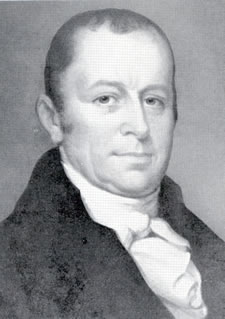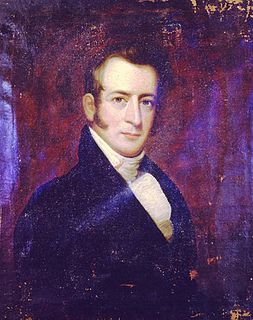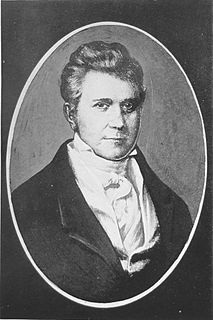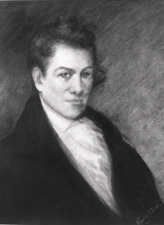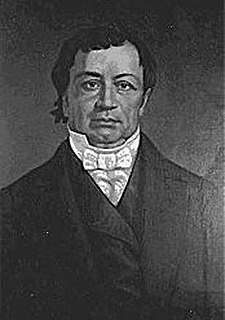| William Miller | |
|---|---|
 | |
| 18th Governor of North Carolina | |
| In office November 29, 1814 –December 6, 1817 | |
| Preceded by | William Hawkins |
| Succeeded by | John Branch |
| Attorney General of North Carolina | |
| In office 1810 | |
| Preceded by | Oliver Fitts |
| Succeeded by | Hutchins Gordon Burton |
| Member of the North Carolina House of Commons | |
| In office 1804–1810 | |
| Personal details | |
| Born | ca. 1783 Warren County, North Carolina |
| Died | (aged 41–42) Key West, Florida |
| Political party | Democratic-Republican |
William Miller (ca. 1783 –September 10, 1825) was the 18th Governor of the U.S. state of North Carolina from 1814 to 1817.
Circa – frequently abbreviated c., ca. or ca and less frequently circ. or cca. – signifies "approximately" in several European languages and as a loanword in English, usually in reference to a date. Circa is widely used in historical writing when the dates of events are not accurately known.

The Governor of North Carolina is the head of state and head of government of the U.S. state of North Carolina. The governor directs the executive branch of the government and is the commander in chief of the military forces of the state. The current governor, Democrat Roy Cooper took office on January 1, 2017, and had a public swearing-in ceremony on January 7, 2017.

In the United States, a state is a constituent political entity, of which there are currently 50. Bound together in a political union, each state holds governmental jurisdiction over a separate and defined geographic territory and shares its sovereignty with the federal government. Due to this shared sovereignty, Americans are citizens both of the federal republic and of the state in which they reside. State citizenship and residency are flexible, and no government approval is required to move between states, except for persons restricted by certain types of court orders. Four states use the term commonwealth rather than state in their full official names.
Born in Warren County, North Carolina, William Miller was orphaned at the age of 9 and inherited a substantial plantation. He briefly attended the University of North Carolina at Chapel Hill in 1802, but did not complete a degree. He began practicing law in 1805 and was named North Carolina Attorney General in 1810. That same year, he was elected to the North Carolina House of Commons, where he served until 1814, for two years as Speaker of the House (1812–1814).

Warren County is a county located in the northeastern Piedmont region of the U.S. state of North Carolina, on the northern border with Virginia. As of the 2010 Census, the population was 20,972. Its county seat is Warrenton. It was a center of tobacco and cotton plantations,Educational later textile mills.

The University of North Carolina at Chapel Hill (UNC), also known as UNC-Chapel Hill,, UNC, Chapel Hill, North Carolina, or simply Carolina is a public research university in Chapel Hill, North Carolina. It is the flagship of the 17 campuses of the University of North Carolina system. After being chartered in 1789, the university first began enrolling students in 1795, which also allows it to be one of three schools to claim the title of the oldest public university in the United States. Among the claimants, the University of North Carolina at Chapel Hill is the only one to have held classes and graduated students as a public university in the eighteenth century.

The Attorney General of North Carolina is the elected head of the state's Department of Justice. The North Carolina Constitution provides for the election of the Attorney General to serve a four-year term. There is no limit on the number of terms a person may serve in the office.
In November 1814, Miller was elected Governor of North Carolina by the General Assembly, at the close of the War of 1812, which he supported. During his term, Miller laid the groundwork for the expansion of the state's educational system, and he served on the University of North Carolina Board of Trustees until his death.

The War of 1812 was a conflict fought between the United States, the United Kingdom, and their respective allies from June 1812 to February 1815. Historians in Britain often see it as a minor theater of the Napoleonic Wars; in the United States and Canada, it is seen as a war in its own right.
After serving the maximum number of three one-year terms as governor, Miller left office in 1817. He returned to the North Carolina Senate in 1821, but lost a re-election bid the following year.

The North Carolina Senate is the upper chamber of the North Carolina General Assembly, which along with the North Carolina House of Representatives—the lower chamber—comprises the legislature of the North Carolina.
U.S. President John Quincy Adams appointed Miller as an envoy to Guatemala in 1825; Miller died in Key West, Florida en route to his post. [1]

John Quincy Adams was an American statesman, diplomat, lawyer, and diarist who served as the sixth president of the United States from 1825 to 1829. He previously served as the eighth United States Secretary of State from 1817 to 1825. During his long diplomatic and political career, Adams also served as an ambassador, and represented Massachusetts as a United States Senator and as a member of the United States House of Representatives. He was the eldest son of John Adams, who served as the second US president from 1797 to 1801. Initially a Federalist like his father, he won election to the presidency as a member of the Democratic-Republican Party, and in the mid-1830s became affiliated with the Whig Party.

Guatemala, officially the Republic of Guatemala, is a country in Central America bordered by Mexico to the north and west, Belize and the Caribbean to the northeast, Honduras to the east, El Salvador to the southeast and the Pacific Ocean to the south. With an estimated population of around 16.6 million, it is the most populated country in Central America. Guatemala is a representative democracy; its capital and largest city is Nueva Guatemala de la Asunción, also known as Guatemala City.




